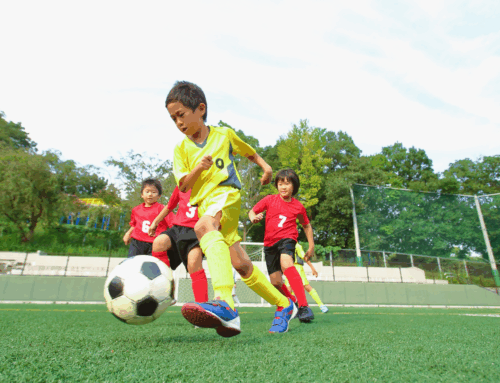Get our exclusive report. Download the iSport360 Club Switching Report Here – For Club Admins, Rec Leaders and Coaches.
Being a Supportive Sports Parent
Emily Galvin is a Philadelphia-based performance psychology consultant with Serve1, a performance consulting team that works with clients to improve performance and make positive lifestyle changes by addressing each client’s biological, psychological, and social needs.
Click here to see how iSport360 is helping coaches and parents share objective feedback on their players.
 As a parent, you make a big commitment to your child’s sporting efforts. Although your child is the one on the field or court, you’re investing time and money carpooling, attending games, buying equipment, and paying for tournament registrations, to name a few. With this kind of commitment, it’s easy to feel very involved in your child’s sport, because in a very real sense, you are. Still, it’s important to remember that it’s his experience; he is the one practicing and competing, and ultimately winning or losing out there. Your job is to support him and help him have fun, compete hard, and develop character through his sporting experiences. Below are tips to help you do just that.
As a parent, you make a big commitment to your child’s sporting efforts. Although your child is the one on the field or court, you’re investing time and money carpooling, attending games, buying equipment, and paying for tournament registrations, to name a few. With this kind of commitment, it’s easy to feel very involved in your child’s sport, because in a very real sense, you are. Still, it’s important to remember that it’s his experience; he is the one practicing and competing, and ultimately winning or losing out there. Your job is to support him and help him have fun, compete hard, and develop character through his sporting experiences. Below are tips to help you do just that.
On the Sideline
Your child can pick your voice out over everything else when they compete. Despite coaches shouting instructions and teammates chattering, your child will hear your voice ring over it all, so if you’re going to make your voice heard, choose your words wisely.
● Encourage, Don’t Coach: Your child has coaches on the bench who call the shots. It makes it challenging for him to focus and fulfill their role on the field or court if you shout your own instructions from the sideline. It can be confusing, distracting, or irritating for some athletes, and at times, can be to his detriment if they follow your lead instead of their coach’s. Instead, use your voice to encourage effort, attitude, and sportsmanship. These are things your child can control.
● Stay Positive: Remember that your conduct reflects you, your child, and the team or club. Even if you think the referee is making terrible calls, the coach is making horrible decisions, or the opposition is playing dirty, focus on your children. Find something positive to say about their performance, or just stay quiet. No good comes of contentious discussions in the bleachers.
● Body Language Speaks Volumes: Even if you choose to be a silent observer on the sideline, you can still communicate a lot to your child. Your body language will tell him whether you’re excited, on the edge of your seat, disappointed, aggravated, and so on. Keep in mind that your child will be acutely aware of you hopping up and down with excitement over a win or great play, but standing still or slouching if he isn’t playing well or the team is losing. As your emotions (both good and bad) surge, try to keep your body language in check. No matter the score, a little clapping, thumbs-upping, and smiling never hurt anyone.
In the Car
It’s important to know how to communicate with your child after a game or match. The trick is figuring out how to talk with him so that he feels supported and knows that you paid attention, but doesn’t feel pressured or end up shutting you out. Here are some tips to successfully skate that line:
● Let Him Take the Lead: When you get in the car after a game, suppress that urge to jump right in and talk about this play and that. Let him initiate a conversation reflecting on the game if he wants to. These conversations can be much more meaningful to him if you let him take the lead. If he does start to talk to you about the game, listen. Really listen to what he’s saying, rather than waiting for your turn to tell him what you think. Show him that you’re listening by saying things like, “I understand that,” or “I saw that, too.” Listening to what he has to say gives you an insight into how he’s processing the game and his performance, and even how he is (or is not) getting along with teammates and coaches.
● Focus on the Process: As you talk to your child about his performance, focus on the process, rather than the outcome. Let him know that you support him and recognize his effort independent of a win or loss on the scoreboard. Pick out a few good plays he had that showed effort, teamwork, effective communication, or a good attitude, for example. Tell him that you recognized that behavior. This shows that you not only reinforce that kind of sportsmanship on the field, but also that you really paid attention to him out there. Of course, there is nothing wrong with celebrating wins! But, win or lose, your child can still have had a good (or bad) performance.
● Talk the Talk: Make sure you take the high road – and bring your child along for the ride – during post-game conversations. Encourage your child to speak respectfully about coaches, teammates, opponents, and referees. Model this, too, by avoiding placing blame or criticizing coach decisions or player performances. Keep the focus on what your child learns from the experience. In doing so, you help your child develop sportsmanship and resilience, and, ultimately, a respect for the game.
Hope you find these guidelines helpful.
 Emily Galvin is a Philadelphia-based performance psychology consultant with Serve1, a performance consulting team that works with clients to improve performance and make positive lifestyle changes by addressing each client’s biological, psychological, and social needs.
Emily Galvin is a Philadelphia-based performance psychology consultant with Serve1, a performance consulting team that works with clients to improve performance and make positive lifestyle changes by addressing each client’s biological, psychological, and social needs.
Learn more or request a demo of our youth sports software that is helping teams improve communication, organization and player development.
December 13, 2016





